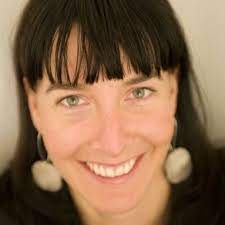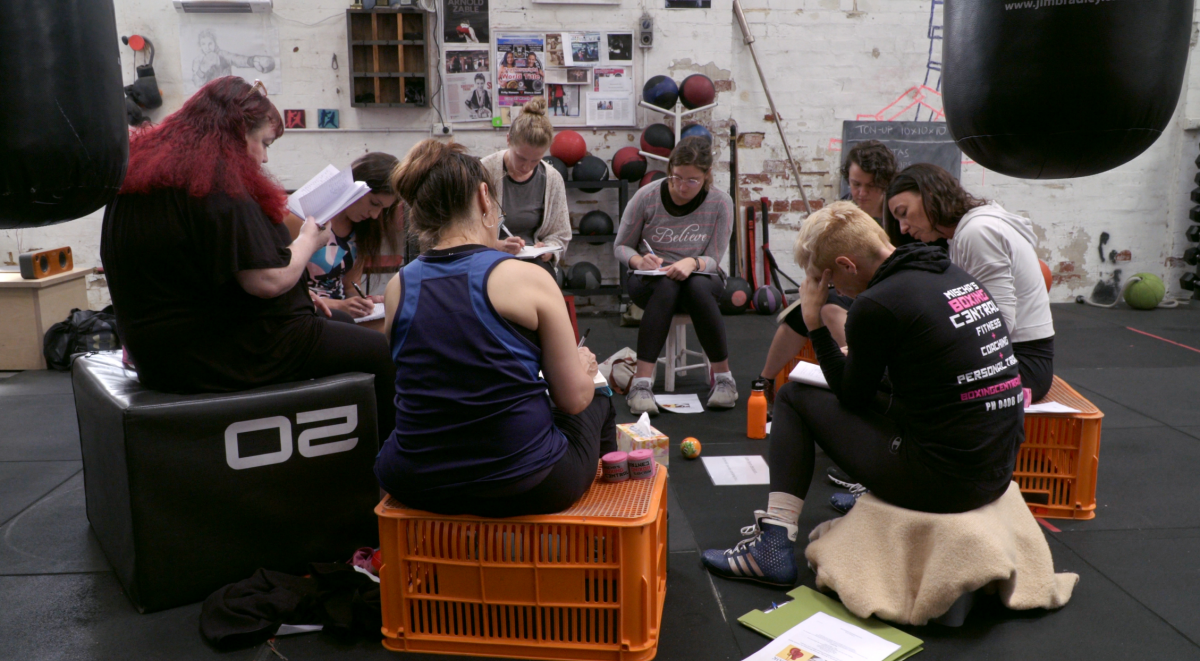Shannon Owen is a producer, director, and lecturer in the Master of Film and Television at the Victorian College of the Arts (VCA), located in the University of Melbourne’s Southbank campus. Her credits include everything from big budget films to animated shorts, and she’s had two documentaries (Just Punishment and Miss South Sudan Australia) commissioned by the ABC. Most recently she directed the documentary Left Write Hook – a powerful look into a recovery program for victims of childhood sexual abuse – which is looking at a 2024 release date.
Left Write Hook follows eight female survivors of childhood sexual abuse who participate in a two year experimental recovery program that combines the physicality of boxing with the emotional power of expressive writing. You can watch the trailer below:
With applications for the VCA Master of Film and Television due at the end of the month, Shannon Owen spoke to ScreenHub about what new students can expect from the course, how to turn a passion into a living, and what it’s like balancing directing and teaching.
Hi, Shannon. Left Write Hook looks like an incredibly powerful documentary – I can’t wait to see it. How did the idea for it first come about?

Shannon Owen: The initial concept was brought to me by a colleague, Donna Lyon, who lectures in the Screen Producing program here in Film and Television at the VCA. Donna is not only a producer on the project but also an on-screen participant – and is, in fact, the founder of the ‘Left Write Hook’ program.
Donna started that workshop in a real grassroots way back in 2019, and she’s got quite an interesting journey about coming to boxing as a survivor. She did some amateur boxing for a while and even won her first match, but then subsequently lost because she got triggered in the ring. When she realised the connection it had to trauma, she did some research into trauma informed approaches and brought the idea of boxing and creative writing together. That’s how the Left Write Hook program was born.
As for the documentary, her office is just a few doors down from mine, so one day she invited me to check out the program and see if there was a documentary in it or not. I went to one session and was hooked straight away. The energy of the space was just amazing – the rawness, the vulnerability, the emotional intensity of what was happening. From there we received some seed funding from the University of Melbourne, which enabled us to work with the participants to do some initial filming and make sure all the participants were on board for the long haul. Then came some formal development investment from Vic Screen before securing production company Sweetshop & Green who helped us raise the full production budget we needed to make the film.
How many years have you been working on this project for?
We started pre-production in 2019, and then early development shooting in 2020. So yes, it is a COVID project. And it’s been four years so far. Those years have allowed for major research though, which showed just how much of an impact the Left Write Hook program had.
Obviously you’ve brought your own learnings and expertise to this film – but was there anything new that you learned about filmmaking?
What I learnt was mostly to do with form. Some elements of this film are quite different to my previous filmmaking work – I’ve tended to work in an observational mode generally, and this is much more experimental. I don’t know whether I learnt anything specifically ‘new’. But I did get the opportunity to apply some ideas and thinking that I had been developing over the last couple of years in the teaching environment: that is, the idea of a co-creative documentary space that invites the subjects to write their own story.
How do you hope audiences will respond to Left Write Hook?
Whenever anyone sees the pitch material they are genuinely moved by it, and although the subject matter is difficult, I think ultimately it’s an empowering and inspirational story. I know sometimes that language can be rolled off as kind of ‘pitch rhetoric’, but it really is a journey with this group of women from space of shame and silence to a space of empowerment. It’s not an easy journey, but that journey towards hope is embedded in in the film, so I think audiences will respond to that and be uplifted by the film.
One of the things that struck me early on was the diversity of women in the room. And I don’t mean diversity in terms of ethnic and gender diversity, which is the common use of the term, but the range of lived experiences. Some of the women are professionals, some of them have really acute mental health conditions, which means that they can’t work. So for me, it really unearthed the unconscious biases I had around stereotypes of survivors. If you look at the statistics, something like one in three people are a childhood sexual abuse survivor – so we all know a survivor. I think the film is going to have an incredible effect because of that.
For students who might be reading about this film and want to apply to the VCA’s Master of Film and Television, what can they expect to get out of the course?
It’s essentially a guided path to making a fully marketable film. Whether they choose to make fiction or non-fiction, students graduate with a completed 15-20 minute stand alone film as well as a developed project ready to pitch in the marketplace. I think one of the things that the VCA’s Film and Television school does well is to help students find their creative voice, encourage them to take risks, and provide them with the with the mentorship and resources to deliver a film at a high creative value and production value.
It’s not uncommon for our student’s graduating films to do well in the film festival circuit, in both documentary and fiction space. In documentary a number of recent graduate films have been repurposed for TV broadcasts and streaming platforms as well. We’ve had a few of our grad films go on the New York Times Op-Docs, which is pretty huge. I’m really proud of the students and their work.
Are there different streams at the VCA for narrative and documentary films? Could I do both as a student?
Good question. We’ve actually done some thinking around the master’s degree over the last few years, and in 2024 we’re launching a revised version of the degree. Historically we’ve had more siloed teaching around narrative or the fiction discipline, and the documentary discipline and the producing discipline. In the past there’s been some teaching crossover, but not really a core curriculum that brings everyone together from day one. So we’re shifting to ensure that this happens in the revised structure.
It’s still called the Master of Film and Television. But when you apply, you can choose to specialise in either filmmaking or screen producing. As the degree progresses, the students come together to make their second semester film and then their graduating film. So the second year of the course is really focused on the production of that 15 to 20 minute film work.
Why is it so important to you to be actively making screen content while teaching others how to do it?
I think in order to teach effectively, you need to be practicing. A creative practice is not something that’s fixed, it evolves as you progress as a creative and respond to the marketplace. This course is designed around a ‘learning through making’ model. I believe that, as a creative practitioner, you need to be making to continue the extension of your own learning, and then be able to feed that back to the students as well.
How easy is it to balance both teaching at the VCA and working in the industry?
The workload can be a challenge, but I really love working with the students and being active in that feedback loop. I learn from them and refine my craft through helping them craft their films. By actively talking about film, looking at film, and advising on the shaping of a film, I am constantly learning – and then I’m able to apply those learnings back to the students.
What’s one piece of advice you’d give to the next generation of filmmakers?
Hone your instincts and trust your gut rather than responding to external forces. By external forces I mean the marketplace, because it’s something that is cyclical, and I think that if you’re constantly chasing other people’s ideas it will become difficult to refine your own creative voice.
If you were a student now, why would you want to undertake the Master of Film and Television at the VCA?
I think we are pretty unique in that ‘learning through making’ model. And the staff here are really passionate about maintaining that as well. At the end of the day, I don’t think there are many other institutions in the country where you really get the opportunity to take the creative risks that you get to take at the VCA. Our point of difference from our competitors is that we’re really focused on encouraging the students to develop confidence around their own ideas and creative vision. And we encourage them to take risks.
It positions you well for entering the industry and the marketplace, and we do that by building confidence. There’s plenty of people out there who will tell you why you shouldn’t make the film that you want to make – and we believe in sticking to your guns.
Important dates:
- Applications for the VCA’s Master of Film and Television close on 31 January
- Left Write Hook is planned for cinematic release in August 2024, with distribution by Bonsai Films
For more information and to apply, head to the VCA website
